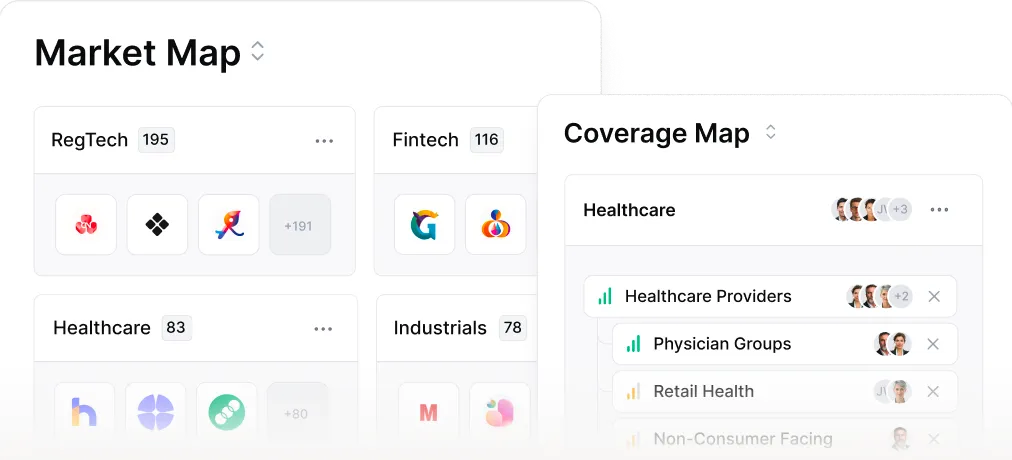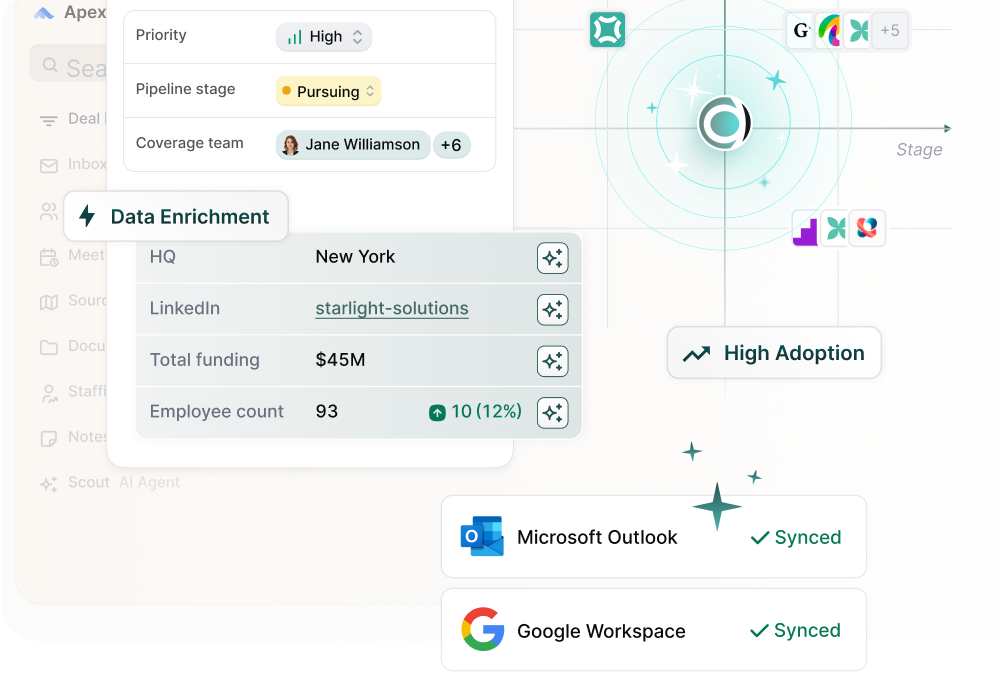Meridian raises $7M seed round led by 645 Ventures.
Read More
Learn how thematic sourcing gives private equity firms a competitive edge by building proprietary pipelines and uncovering better deals.

If the first time your firm hears about an interesting deal is when a banker calls to tell you about an auction, you’re already behind.
At this point, you’re competing against firms that have been following the company for years, with countless hours of due diligence in their back pocket. This means they can go directly to the company to pre-empt the auction because they know exactly how much the company is worth and what they should offer.
To keep up, your firm needs to build a proprietary pipeline driven by strong, high-level theses. Enter thematic sourcing.
This article covers what thematic sourcing means for deal teams, why it’s a more effective approach than waiting for auctions, and proven tips firms should follow when building out a thematic sourcing strategy.
In traditional deal sourcing, firms rely on banker relationships and auctions to source and close deals. And while private equity investors used this approach for years, it’s no longer enough in an increasingly crowded and competitive market.
Thematic sourcing centers on proactively identifying trends and building conviction before assets come to market. This top-down approach ensures that all the opportunities your team explores align with an established, well-researched investment thesis.
While thematic sourcing requires time and resource investment, you can think of it as working smarter, not harder.
It’s a shift away from chasing investment bankers and working against the clock to complete pre-auction diligence. Rather, teams invest their time developing strong investment theses, then methodically search for companies that fit into them.
Pro tip: This process becomes even easier when you have a thematic sourcing tool that surfaces the insights that help your team get in front of the best investment opportunities before your competitors.
When it comes to researching markets and sectors, look to emerging trends that point towards an increase in demand, key regulatory changes, and general sector growth signals.
In a recent article on emerging private equity themes for firms to consider, we explored sub-sectors like:
Sector-based research and sourcing gets you in front of the best companies earlier so you can outcompete other firms. The key differentiator here is at what stage you meet a company in its selling process.
Strong broker relationships in traditional sourcing are valuable, but you’re still just seeing the same opportunities every other firm is being offered. By developing a view on emerging trends and building a thesis around these ideas, firms can find under-the-radar companies before they’re ever on competing firms’ maps.
And when you've already engaged with a management team and have built a relationship over months or years, your firm will be top of mind when they’re eventually ready to sell.
Key takeaway: Thematic sourcing gives firms a narrative for why they are the right buyer, helps them stand out to sellers, and allows them to influence deal terms by moving earlier.
Thematic sourcing is only successful if your firm is systematic in its approach. The process requires deal teams to turn over a lot of stones, which is why you need scalable workflows to govern your thematic sourcing process.
Here are the five steps top firms follow to build out thematic sourcing programs that bring in better deals before the competition even knows they’re on the market.
Thematic sourcing starts, as you may have guessed, with a thesis. The process looks a bit like this: a firm identifies a broad, long-term trend, then creates a narrower investment thesis around this, outlining the drivers of growth, risk, and value-creation levers.
For example, a firm may develop a thesis around the idea that global warming is going to disproportionately impact states like Texas and Arizona, which means that residential cooling will be a growing industry in the region in the next decade.
The next step in the process is to move from an overarching thesis to much narrower, more specific themes that determine where your team invests its time and resources.
Working off our climate change example, the same firm would narrow down through themes, from residential services to HVAC, eventually landing on a sub-theme of AC unit manufacturers in the Southwest.
The deal team would then set company parameters, such as between $10 million and $20 million annual revenue and between 30 and 50 employees, that govern which companies merit due diligence, outreach, and relationship building.
Once you’ve established your thesis and the strict parameters that govern which companies fit into your sub-themes, it’s time to canvas the market. This enables you to identify industry dynamics and key players so you know which organizations are worth looking into.
At this point, your team needs to develop deep knowledge and expertise in the theme and sector. Aside from talking to companies, your associates and VPs should go through industry reports, conduct deep market research, and engage in sector-specific networking.
When a deal team has a clear understanding of the market and key players, they’re able to build a target list of companies. After they’ve built this list, it’s time to systematically research and meet with them to disqualify certain options and spend more time looking into others.
This involves talking to leadership and management, as well as customers of those companies, and collecting data around their performance and potential. That way, you can prioritize which companies and teams your firm should invest its time and energy into.
The key here is to reach out to companies long before a sales process to position your firm as a value-adding partner. When you do this for a few months, you end up with a very clear pipeline of potential companies and owners that will think of your firm first when they’re ready to sell.
As we mentioned, thematic sourcing needs to be systematic. The right tool can help your team formalize and automate this process so it delivers the best results possible.
Thematic sourcing software like Meridian enables teams to build out methodical workflows and reduce manual tasks. These tools facilitate the process by:
Define your thesis and get insights into companies that fit it with AI-powered data enrichment and thematic sourcing features.

Waiting for intermediated deals and auctions means letting valuable deals slip through the cracks. By adopting thematic sourcing strategies, you can develop stronger pipelines, establish differentiated positioning, and bring in higher-quality investments.
Firms that institutionalize thematic sourcing today will be better placed to generate outsized returns for years to come. But to build a structured approach, you need the right deal flow management and sourcing platform.
Meridian helps you build a proprietary pipeline. This differentiates your sourcing approach to stand out to LPs and get in front of the right deals before competing firms. The platform centralizes and enriches market and company data, which eliminates key man risk and gives everyone on your team the insights they need to find and close the best opportunities.
Meridian is built by PE professionals, for PE professionals, to enable a smarter way to source deals so you can get in front of the opportunities that matter most, when it matters most.
Discover how Meridian can streamline deal sourcing and enhance your decision-making

Find out how leading PE firms are using Meridian to enhance their deal workflows.
.webp)
Thematic sourcing is a proactive approach to finding investment opportunities by starting with a big-picture idea, such as demographic shifts, technological innovation, or regulatory change. Then, you identify companies that are best positioned to benefit from that trend.
Rather than reacting to deals that come through bankers and auctions, private equity firms use thematic sourcing to build conviction early, map target lists, and engage directly with management teams.
A thematic strategy focuses on following long-term industry trends. For private equity firms, it means building an investment thesis around themes like AI adoption, renewable energy, or healthcare digitalization and using those themes to guide sourcing, diligence, and portfolio construction.
Thematic stock investing looks across industries to find businesses aligned with a shared structural theme. For example, an investor might target companies driving or benefiting from climate innovation, automation, or cybersecurity growth.
Table of Contents


Gain an in-depth understanding of private equity relationship management software so you can pick the tool that best fits your firm’s needs.

